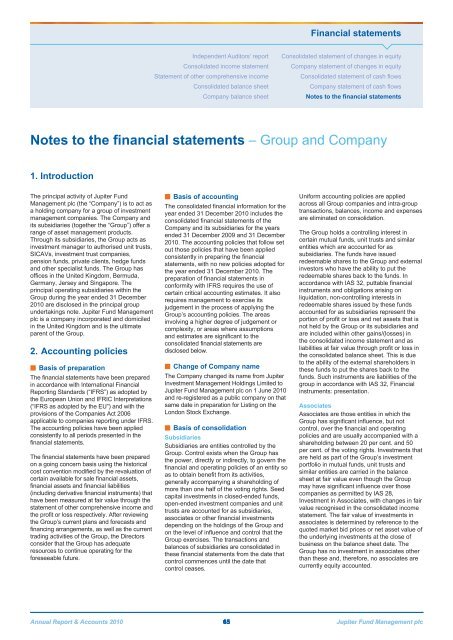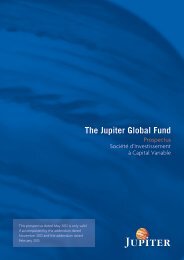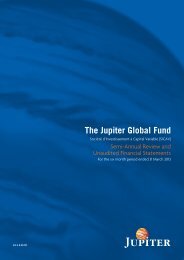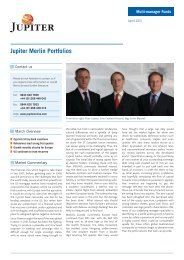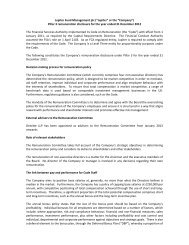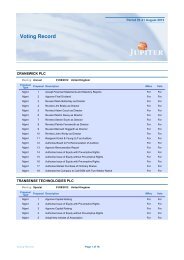Jupiter Annual Report 2010 - Jupiter Asset Management
Jupiter Annual Report 2010 - Jupiter Asset Management
Jupiter Annual Report 2010 - Jupiter Asset Management
Create successful ePaper yourself
Turn your PDF publications into a flip-book with our unique Google optimized e-Paper software.
Financial statements<br />
Independent Auditors’ report<br />
Consolidated income statement<br />
Statement of other comprehensive income<br />
Consolidated balance sheet<br />
Company balance sheet<br />
Consolidated statement of changes in equity<br />
Company statement of changes in equity<br />
Consolidated statement of cash flows<br />
Company statement of cash flows<br />
Notes to the financial statements<br />
Notes to the financial statements – Group and Company<br />
1. Introduction<br />
The principal activity of <strong>Jupiter</strong> Fund<br />
<strong>Management</strong> plc (the “Company”) is to act as<br />
a holding company for a group of investment<br />
management companies. The Company and<br />
its subsidiaries (together the “Group”) offer a<br />
range of asset management products.<br />
Through its subsidiaries, the Group acts as<br />
investment manager to authorised unit trusts,<br />
SICAVs, investment trust companies,<br />
pension funds, private clients, hedge funds<br />
and other specialist funds. The Group has<br />
offices in the United Kingdom, Bermuda,<br />
Germany, Jersey and Singapore. The<br />
principal operating subsidiaries within the<br />
Group during the year ended 31 December<br />
<strong>2010</strong> are disclosed in the principal group<br />
undertakings note. <strong>Jupiter</strong> Fund <strong>Management</strong><br />
plc is a company incorporated and domiciled<br />
in the United Kingdom and is the ultimate<br />
parent of the Group.<br />
2. Accounting policies<br />
■■Basis of preparation<br />
The financial statements have been prepared<br />
in accordance with International Financial<br />
<strong>Report</strong>ing Standards (“IFRS”) as adopted by<br />
the European Union and IFRIC Interpretations<br />
(“IFRS as adopted by the EU”) and with the<br />
provisions of the Companies Act 2006<br />
applicable to companies reporting under IFRS.<br />
The accounting policies have been applied<br />
consistently to all periods presented in the<br />
financial statements.<br />
The financial statements have been prepared<br />
on a going concern basis using the historical<br />
cost convention modified by the revaluation of<br />
certain available for sale financial assets,<br />
financial assets and financial liabilities<br />
(including derivative financial instruments) that<br />
have been measured at fair value through the<br />
statement of other comprehensive income and<br />
the profit or loss respectively. After reviewing<br />
the Group’s current plans and forecasts and<br />
financing arrangements, as well as the current<br />
trading activities of the Group, the Directors<br />
consider that the Group has adequate<br />
resources to continue operating for the<br />
foreseeable future.<br />
■■Basis of accounting<br />
The consolidated financial information for the<br />
year ended 31 December <strong>2010</strong> includes the<br />
consolidated financial statements of the<br />
Company and its subsidiaries for the years<br />
ended 31 December 2009 and 31 December<br />
<strong>2010</strong>. The accounting policies that follow set<br />
out those policies that have been applied<br />
consistently in preparing the financial<br />
statements, with no new policies adopted for<br />
the year ended 31 December <strong>2010</strong>. The<br />
preparation of financial statements in<br />
conformity with IFRS requires the use of<br />
certain critical accounting estimates. It also<br />
requires management to exercise its<br />
judgement in the process of applying the<br />
Group’s accounting policies. The areas<br />
involving a higher degree of judgement or<br />
complexity, or areas where assumptions<br />
and estimates are significant to the<br />
consolidated financial statements are<br />
disclosed below.<br />
■■Change of Company name<br />
The Company changed its name from <strong>Jupiter</strong><br />
Investment <strong>Management</strong> Holdings Limited to<br />
<strong>Jupiter</strong> Fund <strong>Management</strong> plc on 1 June <strong>2010</strong><br />
and re-registered as a public company on that<br />
same date in preparation for Listing on the<br />
London Stock Exchange.<br />
■■Basis of consolidation<br />
Subsidiaries<br />
Subsidiaries are entities controlled by the<br />
Group. Control exists when the Group has<br />
the power, directly or indirectly, to govern the<br />
financial and operating policies of an entity so<br />
as to obtain benefit from its activities,<br />
generally accompanying a shareholding of<br />
more than one half of the voting rights. Seed<br />
capital investments in closed-ended funds,<br />
open-ended investment companies and unit<br />
trusts are accounted for as subsidiaries,<br />
associates or other financial investments<br />
depending on the holdings of the Group and<br />
on the level of influence and control that the<br />
Group exercises. The transactions and<br />
balances of subsidiaries are consolidated in<br />
these financial statements from the date that<br />
control commences until the date that<br />
control ceases.<br />
Uniform accounting policies are applied<br />
across all Group companies and intra-group<br />
transactions, balances, income and expenses<br />
are eliminated on consolidation.<br />
The Group holds a controlling interest in<br />
certain mutual funds, unit trusts and similar<br />
entities which are accounted for as<br />
subsidiaries. The funds have issued<br />
redeemable shares to the Group and external<br />
investors who have the ability to put the<br />
redeemable shares back to the funds. In<br />
accordance with IAS 32, puttable financial<br />
instruments and obligations arising on<br />
liquidation, non-controlling interests in<br />
redeemable shares issued by these funds<br />
accounted for as subsidiaries represent the<br />
portion of profit or loss and net assets that is<br />
not held by the Group or its subsidiaries and<br />
are included within other gains/(losses) in<br />
the consolidated income statement and as<br />
liabilities at fair value through profit or loss in<br />
the consolidated balance sheet. This is due<br />
to the ability of the external shareholders in<br />
these funds to put the shares back to the<br />
funds. Such instruments are liabilities of the<br />
group in accordance with IAS 32, Financial<br />
instruments: presentation.<br />
Associates<br />
Associates are those entities in which the<br />
Group has significant influence, but not<br />
control, over the financial and operating<br />
policies and are usually accompanied with a<br />
shareholding between 20 per cent. and 50<br />
per cent. of the voting rights. Investments that<br />
are held as part of the Group’s investment<br />
portfolio in mutual funds, unit trusts and<br />
similar entities are carried in the balance<br />
sheet at fair value even though the Group<br />
may have significant influence over those<br />
companies as permitted by IAS 28,<br />
Investment in Associates, with changes in fair<br />
value recognised in the consolidated income<br />
statement. The fair value of investments in<br />
associates is determined by reference to the<br />
quoted market bid prices or net asset value of<br />
the underlying investments at the close of<br />
business on the balance sheet date. The<br />
Group has no investment in associates other<br />
than these and, therefore, no associates are<br />
currently equity accounted.<br />
<strong>Annual</strong> <strong>Report</strong> & Accounts <strong>2010</strong> 65 <strong>Jupiter</strong> Fund <strong>Management</strong> plc


